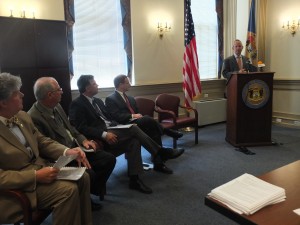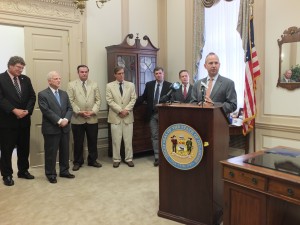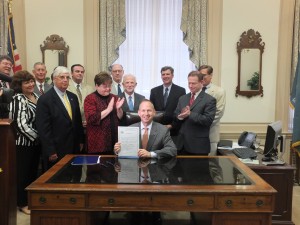Report details state rules changed or eliminated
Dover, DE – Capping a year-long review undertaken at a dozen state agencies, Governor Jack Markell released a report from his office today detailing modifications to or the deletion of more than 140 state regulations. Markell provided an overview of the initiative today to lawmakers, including legislators on the Small Business Caucus, representatives from the state’s chambers of commerce and members of the business community who provided input during the process.
As a result, state agencies eliminated unwarranted requirements on businesses and individuals, extended compliance deadlines for businesses, instituted timelines for government officials to respond to business proposals, and removed outdated and duplicative rules. (See fact sheet below)
“We recognize the value of appropriate regulations that protect Delawareans, such as ensuring the quality of our food and water, the condition of our medical facilities and the safety of our roads,” said Markell. “But we must be vigilant about preventing unreasonable burdens that strain business owners and impede public services. As a result of the changes in this report, we are making it easier to do business in Delaware, making government operations more efficient, and making agency rules simpler to use and understand.”
The initiative began in June 2012, when the Governor issued Executive Order (EO) 36, which brought together citizens, businesses and state agencies to identify and remove regulatory hurdles. Each department conducted an internal review and was required to hold at least one public forum in each county, where it accepted written comments and suggestions.
“Self-examination is difficult, but our Governor and cabinet secretaries realized the importance of updating regulations and looked at their organizations thoroughly to make much-needed changes,” said Lieutenant Governor Matt Denn. “Small businesses, Chambers of Commerce and others played valuable roles in this process by offering sincere and thoughtful suggestions to help improve regulations and processes currently in place. This is yet another step to making Delaware a place where people want to build and grow their businesses.”
“This has been a priority of the Small Business Caucus and it is especially important that the public had the chance to be engaged in the process,” said Rep. Bryon H. Short, D-Highland Woods, who co-chairs the bipartisan House Small Business Caucus. “I appreciate the Governor listening to the Caucus and the needs expressed by the business community to make this a reality.”
 “I want to compliment Governor Markell and the leaders of the Small Business Caucus for their leadership in this effort,” said Richard Heffron, Senior Vice President of Government Affairs at the Delaware State Chamber of Commerce. “The Chamber appreciated the opportunity to participate in the process and address the impact of regulations on the small business community.”
“I want to compliment Governor Markell and the leaders of the Small Business Caucus for their leadership in this effort,” said Richard Heffron, Senior Vice President of Government Affairs at the Delaware State Chamber of Commerce. “The Chamber appreciated the opportunity to participate in the process and address the impact of regulations on the small business community.”
To illustrate the impact of EO 36, Phil McGinnis, of McGinnis Commercial Real Estate Co. in Dover, spoke about one suggestion that he had brought to state leaders and that was reflected in the report. The Department of Transportation had previously required all new developments to provide sidewalks, or other “multi-use paths.” McGinnis and others said this rule added an unnecessary burden for projects in sparse areas where connections with other paths are not possible. Following the EO 36 review, DelDOT’s requirements will no longer apply to these areas.
“I’m personally grateful that Governor Markell initiated E.O. 36,” said McGinnis. “And I’m glad that the review does not stop here.”
The report includes regulatory adjustments by the Department of Agriculture, Department of Children, Youth & Their Families (DSCYF), Delaware Economic Development Office (DEDO), Department of Education, Department of Finance, Department of Health & Social Services (DHSS), Department of Labor, Office of Management and Budget, Department of Natural Resources & Environmental Control (DNREC), Department of Safety and Homeland Security (DSHS), Department of State and Department of Transportation (DelDOT).
Department of Agriculture Secretary Ed Kee, DNREC Secretary Colin O’Mara, DEDO Director Alan Levin and DelDOT Deputy Secretary Nicole Majeski spoke at the event to offer examples of regulatory changes.
EO 36 calls for another full review process no more than three years after the submission of today’s report to the General Assembly.
FACT SHEET: Executive Order 36 – Review of State Regulations
June 27, 2013
By The Numbers
- 12 Executive Branch agencies engaged in the regulatory review process required by EO 36.
- 385 regulations were subject to review under EO 36. (Note: many agencies also reviewed regulations not covered by the Executive Order.)
- As a result of EO 36, 144 regulations are being amended or deleted, with 83 regulations being amended and 61 deleted.
- Agencies conducted a total of 39 public hearings during this process (13 in each county).
- In connection with hearings, agencies published notice and request for comments a total of 50 times in newspapers statewide (32 times in daily papers, 18 times in weeklies), in addition to notices on the State’s Public Meeting Calendar, and submission forms on Department websites.
- In total, agencies received 234 public comments.
- 93 were relevant to a specific regulation (excluding 62 on a single non-nurse midwifery rule)
- Other comments concerned non-regulatory issues and received agency responses.
Highlighted Examples of Regulatory Changes
Making it easier to do business in Delaware:
- DelDOT: Because small businesses often create fewer traffic burdens than larger counterparts, creating new approval process for development plans involving small businesses.
- DelDOT: Amending regulation to allow flexibility for developments in low-density areas from requirement that sidewalks be installed in new developments.
- DNREC: Extended deadlines for companies and individuals to retrofit above ground and underground storage tanks for compliance, while putting a timeline on the Department to respond to tank owners.
- DNREC: Extended from 3 to 6 years the time by which a new large on-site wastewater system can be constructed before a permit expires.
- DHSS: Creating a new limited license for operators of small water systems, reducing the accompanying class requirement from 11 weeks to 2 days.
- Department of Agriculture: Rewarded entrepreneurship and enabled more growth by small farmers who sell products at their farms by increasing their sale limits.
Making government operations more efficient:
- DSCYF: Changed requirements for staff at child care facilities by increasing pre-employment training to better ensure the safety of children, while requiring less time away from duties for annual training.
- Department of Education: Decreased requirements for document submissions for schools and districts and allowed online postings to address unnecessary paperwork burdens that don’t help students.
- Department of State: Recommended 124 specific changes to regulations governing 32 boards and commissions and the professions they oversee.
Making agency rules simpler to use and understand:
- Department of Labor: Reduced the of unemployment insurance regulations from 45 to 21, while updating the remaining UI regulations to reflect statutory and technological changes over the past 50 years. Changes included removing a rule no longer required by Delaware law and eliminating regulations that refer to an “Appeals Tribunal” that no longer exists.
- Economic Development Office: Amended or deleted 9 out of 10 regulations examined, eliminating 4 that relate to tourism programs no longer in operation and one for a defunct energy alternatives program.
- DelDOT: Will delete 7 outdated or inapplicable DMV regulations and will clarify and consolidate an additional 15 DMV regulations that are duplicative or otherwise should be streamlined.
Photos from the event can be viewed on Flickr

